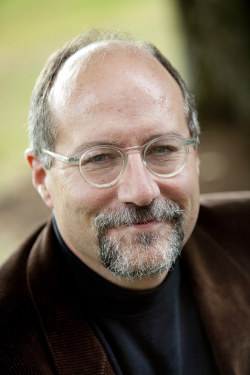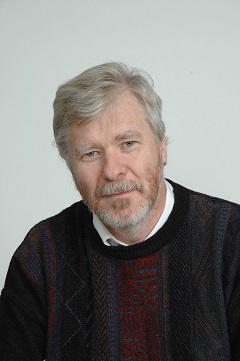The Historical Jesus and the Christian Apocrypha Panel
One of the panels at this year's York Christian Apocrypha Symposium features a reassessment of North American scholarship's use of the Christian Apocrypha for studying the Historical Jesus. The panel features Stephen Patterson, well-known for his work on the Gospel of Thomas, with responses from Mark Goodacre and John Kloppenborg. This particular session takes place Friday, September 27 from 3:30-5:30. For more information, see the Symposium's web page (HERE).
 Stephen J. Patterson, “The Apocryphal Gospels and North American Historical Jesus Research”
Stephen J. Patterson, “The Apocryphal Gospels and North American Historical Jesus Research”
Stephen J. Patterson is the George H. Atkinson Chair in Religious Studies at Willamette University (Salem, Oregon). His most recent monograph, Beyond the Passion: Rethinking the Death and Life of Jesus (Philadelphia: Fortress, 2004), discusses the death and resurrection of Jesus, held by many Christians to be the central event which gives meaning to Jesus’ ministry. Patterson is also the author of The Gospel of Thomas and Jesus (Sonoma, Calif.: Polebridge, 1993) as well as The God of Jesus: The Historical Jesus and the Search for Meaning (Philadelphia: Trinity, 1998). He has co-edited several works on the figure of Jesus, and has contributed over 50 articles and reviews to scholarly journals and critical volumes.
Patterson observes that scholars are divided over the importance of non-canonical texts. “For some, the rediscovery of Christian Apocrypha in our generation has meant a complete change in our approach to the historical Jesus question. For others, it has changed nothing,” he says. A Fulbright scholar, Patterson received his PhD from Claremont Graduate School in 1988. Patterson’s long career of examining apocryphal Jesus traditions is reflected in a newly-released collection of his previously published articles, entitled The Gospel of Thomas and Christian Origins: Essays on the Fifth Gospel (Brill, 2013). In addition, he occasionally provides his expertise on Biblical topics for documentaries on the Discovery Channel and National Geographic.
Respondents:
 John S. Kloppenborg is Professor and Chair of the Department for the Study of Religion at the University of Toronto. He has taught at the University of St. Michael’s College and the University of Windsor, and been visiting Professor of Religion at the Claremont Graduate University, the University of Calgary, Clare Hall (Cambridge), the University of Helsinki, Centre chrétien d’études juïves (Jerusalem), and the Tantur Ecumenical Institute (Jerusalem).
John S. Kloppenborg is Professor and Chair of the Department for the Study of Religion at the University of Toronto. He has taught at the University of St. Michael’s College and the University of Windsor, and been visiting Professor of Religion at the Claremont Graduate University, the University of Calgary, Clare Hall (Cambridge), the University of Helsinki, Centre chrétien d’études juïves (Jerusalem), and the Tantur Ecumenical Institute (Jerusalem).
His most recent publications are Attica, Central Greece, Macedonia, Thrace. Vol. 1 of Greco-Roman Associations: Texts, Translations, and Commentary (Berlin and New York: Walter de Gruyter, 2011), with Richard S. Ascough; Q, The Earliest Gospel: An Introduction to the Original Sayings and Stories of Jesus (Louisville and London: Westminster John Knox, 2008), The Tenants in the Vineyard: Ideology, Economics, and Agrarian Conflict in Jewish Palestine (Tübingen: Mohr Siebeck 2006), Excavating Q: The History and Setting of the Sayings Gospel (Minneapolis: Fortress Press; Edinburgh: T. & T. Clark, 2000); and The Critical Edition of Q: A Synopsis, including the Gospels of Matthew and Luke, Mark and Thomas, with English, German and French translations of Q and Thomas (Leuven: Peeters; Minneapolis: Fortress Press, 2000) with James M. Robinson and Paul Hoffmann. He is currently working with Richard Ascough and Phil Harland on a collection of inscriptions concerning associations (collegia, thiasoi) in Mediterranean antiquity, and the Hermeneia commentary on James.
 Mark Goodacre is Professor of New Testament and Christian Origins in the Religion Department at Duke University. He specializes in the study of early Christian Gospels and especially the Synoptic Problem. In the field of Christian Apocrypha, he has published on the Gospel of Thomas and on the story of the Nag Hammadi discoveries. He is currently working on the representation of Mary in early Christian works like the Gospel of Mary and the Gospel of Philip.
Mark Goodacre is Professor of New Testament and Christian Origins in the Religion Department at Duke University. He specializes in the study of early Christian Gospels and especially the Synoptic Problem. In the field of Christian Apocrypha, he has published on the Gospel of Thomas and on the story of the Nag Hammadi discoveries. He is currently working on the representation of Mary in early Christian works like the Gospel of Mary and the Gospel of Philip.
